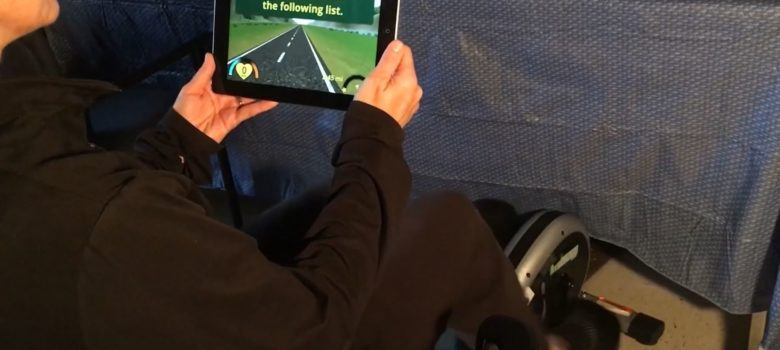

iPACES: Neuro-exergame Study for Patients With Mild Cognitive Impairment
by Guest Author
SANTA MONICA – Pacific Neuroscience Institute located at Providence Saint John’s Health Center has joined a multi-center clinical trial examining the effects of exercise on brain health using iPACES, an interactive physical and cognitive exercise system.
The study looks at the impact simultaneous and interactive mental and physical exercise can have on brain health for patients older than 50 with mild cognitive impairment (MCI).
Researchers plan to study the connection between exercise and brain health with iPACES, a specialized and patented neuro-exergame. The videogame includes a virtual bike path down “Memory Lane” where one completes errands in the neighborhood or recalls items to pick up at the farmer’s market. Progress along the path is controlled by physical movement and uses portable pedal-and-play technology that is intended for patients and caregivers coping with brain conditions, such as autism and Alzheimer’s Disease.
“Through this clinical trial, we hope to shine light on all the positive effects exercise can have as a treatment modality for a multitude of conditions,” said Dr. Stella Panos who works at PNI’s Brain Health Center and is actively involved with the clinical trial. “iPACES is a fully remote trial that can be completed from the comfort of one’s home. It is a safe, in-home exercise tool that allows us to track and compare cognitive and biomarker outcomes through mental and physical exercise.”
Clinical trial participants will be tasked with using a tablet to complete cognitive challenges while following a virtual cycling pathway and pedaling on an under-desk elliptical to maintain an exercise-level heart rate. All equipment and materials are provided without cost via funding provided by a grant from the National Institute on Aging (NIA: R44 AG071063).
“iPACES Memory Lane adapts to the ability of the player so that the length and difficulty of the cognitive challenges adjust to the individual,” said Dr. Cay Anderson-Hanley, principal investigator of the iPACES trial.
“We’ve added additional scenic elements and a virtual coach to facilitate long-term use. We are hopeful that this type of exercise will make a difference in the lives of MCI patients and caregivers aiming to stave off cognitive decline. Participants enrolling to pedal-n-play iPACES will help address that question in this scientifically grounded clinical trial.”
During this clinical trial, participants are asked to use iPACES three to five times per week for six months. Participants also will undergo regular videoconference assessments, with a follow up one year later.
Additionally, a virtual coach and integrated mobile apps will remind and encourage participants to engage in exercise regularly while monitoring their progress.
“We know that behavioral interventions like exercise have been linked to enhanced brain health and can be useful in the prevention and remediation of cognitive decline,” Dr. Panos said. “With dementia cases on the rise, we hope that this research lends itself to a greater understanding of the short- and long-term effects of simultaneous mental and physical exercise on brain health.”
Those interested in learning more about iPACES or applying to be part of the clinical trial can do so by visiting www.myipaces.org, emailing info@myipaces.org or calling 737-747-2237.
About Dr. Stella Panos

Stella Panos, PhD, is a neuropsychologist who focuses on adult and geriatric neuropsychological assessment. As the Director of Neuropsychology at Pacific Brain Health Center, she works with patients who present with an array of medical/neurological illnesses (e.g. Alzheimer’s disease, Dementia with Lewy Bodies, Parkinson’s disease, HIV, traumatic brain injury, brain tumor, etc.) in various medical settings (acute inpatient, residential rehabilitation, outpatient). With several years of experience, Dr. Panos helps patients suffering from the neurobehavioral health sequelae of various neurological illnesses, many of whom suffer from age-related neurodegenerative disorders.
Useful Links
Last updated: April 21st, 2022